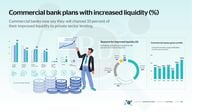
The Central bank of Kenya, Nairobi. FILE PHOTO | DENNIS ONSONGO | NMG
Growth in private sector credit growth has hit a new six-month high of 13.2 percent despite lingering concerns of soaring interest rates and a deterioration in asset quality represented by high non-performing loans in banks.
Central Bank of Kenya (CBK) data shows private sector credit growth reached its highest rate since October 2022 in April, rising from 11.6 percent in March.
Read: State faces rates pressure as private sector loans rise
The CBK observes that the rise in private sector credit is a result of strong credit growth in broad economic sectors which has been mirrored by the steady discharge of new loans.
“Strong credit growth was observed in the sectors of manufacturing, transport and communication, trade and consumer durables at 21.7 percent, 18, 13.7 and 13.3 percent respectively,” the CBK said last week.
“The number of loan applications and approvals remain strong, reflecting increased demand.”
Private sector credit has trended upwards across last year and moved into a double-digit rate of growth in March 2021, for the first time since the entry of interest controls on commercial bank loans in 2016.
The extended growth of private sector credit however sits against a rising interest rates environment characterized by a runaway inflation rate and an upward adjustment to the benchmark lending rate by the CBK.
Interest rates on other yield bearing assets have also soared with the average commercial bank lending rate for instance rising to a 58-month high rate of 13.09 percent in March.
Comparatively, the return from high value bank deposits stood at 7.6 percent at the end of March, the highest rate since September 2018.
Similarly, yields on government securities and overdraft facilities have been on a tear, with the former being driven by the demand for risk adjusted returns from investors.
CBK’s recent credit survey covering three months to the end of March shows businesses and households requested for new credit facilities based on optimism on the rebounding economic environment.
“The perceived increased demand for credit in agriculture, manufacturing, trade and personal and household sectors is attributed to consumers being confident that the economy is on an upswing. The weather is also expected to perform better in 2023,” the CBK stated.
Despite the multi-year highs in the cost of borrowing, the price of credit did not feature as a major factor affecting the demand for credit in the period.
The deterioration of the banking sector loan book had further been expected to impact lending with commercial banks shunning borrowers over rising loan defaults.
Read: Private sector lending rises fastest in five years
However, in spite of the industry’s non-performing loan ratio rising to 14.6 percent, the highest rate since June last year, private sector credit growth has continued to grow undeterred.
→kmuiruri@ke.nationmedia.com



No comments:
Post a Comment